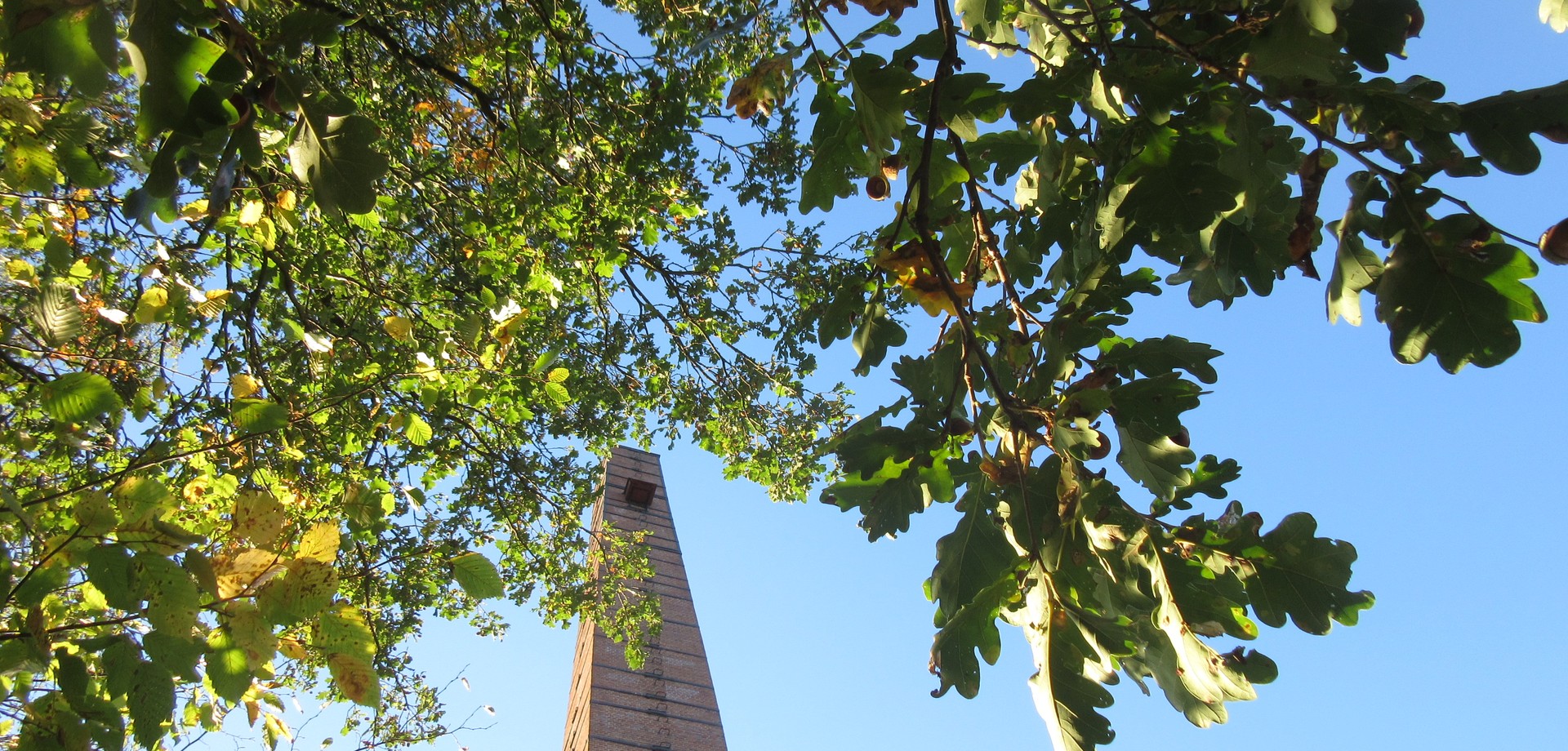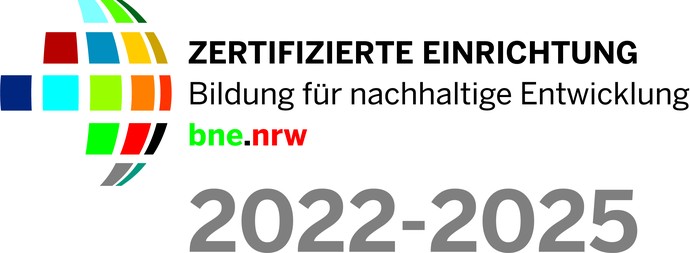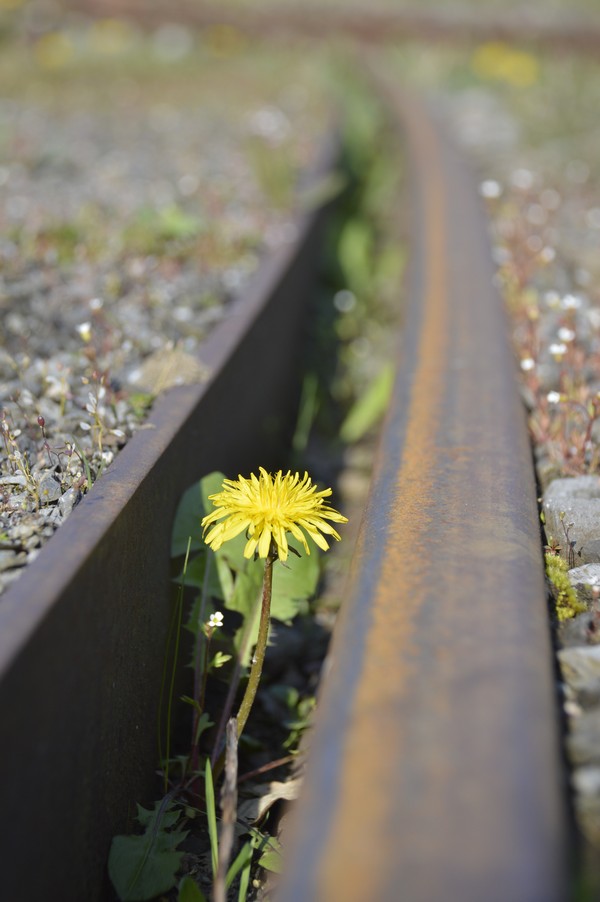
Education for sustainable development
Education for sustainable development (ESD) empowers each individual to actively and responsibly shape a future society worth living in. Through exhibitions and educational programmes, the Nachtigall Colliery informs visitors about the connections between raw material extraction, especially coal mining, and landscape change, biodiversity and climate change. We encourage our visitors to question their own behaviour in terms of energy and resource consumption and to develop new courses of action for the sustainable development of our society.
ESD is an integral part of our mission statement and educational concept. It is based on the United Nations Agenda 2030 with its 17 Sustainable Development Goals (SDGs).
Promoting knowledge – imparting values – shaping change
In 2003, the Regional Association of Westphalia-Lippe (LWL) opened the LWL Museum Zeche Nachtigall. The colliery is one of the oldest mining sites in the Ruhr area. Three raw materials – hard coal, shale clay and sandstone – are stored here in one place. A visitor mine provides authentic insights into the early days of mining. Important geotopes and the GeoPark Ruhrgebiet information centre illustrate the geological dimensions of raw material formation.
The Nachtigall colliery is one of eight sites belonging to the Westphalian State Museum of Industrial Heritage. With its outstanding monuments and comprehensive collection, this association forms a memorial to the region. In its work, the LWL Museum also sees itself as a forum for social and future-relevant issues. Our starting point for this is always the historical, authentic location. As a former industrial site, the Nachtigall colliery is committed to issues such as resource consumption and consumption, landscape change, ecology, climate and energy production.
What we do and what goals we pursue
As a museum, our core tasks include collecting and preserving evidence of industrial history and researching it. Education and communication are another pillar of the museum's work. With exhibitions, educational offerings and event programmes, the Nachtigall Colliery vividly and dynamically conveys the 300-year history of the site: from colliery operations to brick production and slate and sandstone quarrying. Participatory, intergenerational and inclusive communication formats enable visitors to learn about the effects of the industrial age at this authentic location, to exchange ideas and to gain skills for transformative action for the present and the future.
In terms of content, we address the interaction and transformation of work, technology, people and the environment in regional and global contexts. In doing so, we link the five dimensions of ESD: ecology, economy, social issues, politics and culture. Ecological topics are a particular focus of our educational offerings: We enable a wide range of experiences in nature and bring to life the transformation of industrial wasteland into a habitat for numerous animal and plant species. In this way, we promote the ability to understand ecological relationships and distinguish between sustainable and unsustainable developments. Knowledge about responsible and appreciative interaction with nature and its resources enables people to change their own behaviour and act with foresight.
Who we work for and with
Its attractive location on the Ruhr, the mining history trail in the neighbouring Muttental valley and the Ruhr Valley Cycle Route make this anchor point on the Industrial Heritage and Nature Route a popular destination for excursions. Families in particular combine leisure and learning here for a lasting educational experience. The museum offers target group-specific learning opportunities for lifelong education – from kindergarten children to school pupils to the elderly.
The Nachtigall colliery is an important hub in the regional educational landscape. We cooperate in long-term partnerships with kindergartens and family centres, schools, adult education centres and universities, as well as senior citizens' facilities, and we are in contact with civil society associations and environmental organisations. Together, we continue to develop our educational mission, goals and competencies. With our support association, we encourage civic engagement and actively incorporate it into our museum work.
How we work
The museum sees itself as a forum, a testing ground and a free space. The diverse formats of exhibitions and educational programmes are specifically designed to encourage a high degree of participation, multiple perspectives and openness to results. Our goal is creative competence.
Therefore, museum staff no longer see themselves merely as imparters of knowledge, but as facilitators of topics and processes. They respect participants as equals and experts in their own right. In their teaching, they use a variety of museum and environmental education methods to create access for a diverse audience. The staff are committed to treating visitors in an inclusive, diverse and discrimination-sensitive manner.
We are a dedicated team and work together to develop new concepts. We understand collegiality as treating each other with respect and consideration. We are continuously working to improve our own responsible thinking and actions, as well as to optimise the use of materials and resources in the museum in a sustainable manner. We participate in social discourse and regularly undergo further training on topics relevant to the museum and education for sustainable development.
With our goals, our actions and our expertise, the museum sees itself as an ambassador for education for sustainable development (ESD).
LWL Museum Nachtigall Colliery Witten
The LWL Museum Zeche Nachtigall in Witten is a versatile educational, leisure and adventure destination. Located on the authentic site, it shows the geological formation of hard coal and conveys its key role for the Ruhr area and the people in this region on their way into the industrial age. The visitor mine offers a hands-on experience of mining history. The two ring kilns for brick production highlight the reuse of the former colliery site. The industrial wasteland brings nature experiences and the transformation into a habitat for numerous animal and plant species to life.
Our goals for education for sustainable development
Society and the environment are changing at an ever-increasing pace. In line with the concept of education for sustainable development, the team at the Nachtigall Colliery has set itself the goal of promoting a responsible and constructive approach to these changes. Engaging with the history of the site reveals complex interrelationships. This understanding strengthens the ability to distinguish between sustainable and unsustainable developments. The museum offers different perspectives by connecting history and the present, as well as regional and global references. It creates diverse approaches to forming one's own identity and offers space for self-reflection. As a place for lifelong learning, the museum aims to empower people of all ages, especially children and young people, to think and act sustainably in order to help shape their own future and that of their generation.
Educational and outreach work plays a key role in this. It builds a bridge between the historical site and visitors. Through mutual dialogue, current issues are developed that enable critical examination of the economic, social and ecological aspects of industrialisation. The example of coal as a fossil fuel not only illustrates 300 million years of geological history and the dawn of the industrial age, but also allows us to incorporate present and future-oriented goals of education for sustainable development: What role did coal play in energy supply in the past? What role does it play today? What alternatives do renewable energies offer? How have industrialisation and structural change in the coal and steel industry shaped our working environments and lifestyles? What impact has industrialisation had on the landscape and climate change? How are ecosystems developing today on industrial wasteland? Through direct encounters with phenomena from nature and technology, visitors are inspired to choose a sustainable lifestyle. The museum sees itself as a place of encounter and participation. It offers its own perspective, but at the same time allows for new perspectives. It sees its work as a process that has an impact both on society and within the museum itself.
Our target groups
The Nachtigall Colliery is open to a broad audience that reflects the diversity of society. Diversity, inclusion, equality and participation are the guiding principles of our work. The museum initiates informal, lifelong learning processes that focus on both the personality of each individual and the development of society. The museum works not only for, but also with, the various visitor groups. It takes into account emotional, cognitive, social and physical needs, as well as the different motivations for visiting a museum. In order to create access for greater participation equality, exhibition formats are inclusive and museum educational programmes are tailored exclusively to potential visitor groups.
As an extracurricular learning venue, Zeche Nachtigall offers tailor-made museum and environmental education programmes to promote educational biographies. The programmes for kindergartens and schools are based on the respective education and teaching plans and explicitly take into account the guidelines for education for sustainable development. To promote equal participation, admission is free for children and young people up to and including the age of 17. School classes can have their travel expenses reimbursed through the Mobility Fund of the Regional Association of Westphalia-Lippe.
The Nachtigall Colliery is a popular leisure and adventure destination. That is why the museum, with its exhibitions, educational programmes and events, also focuses on the needs and expectations of individual visitors, families and other groups such as cycle tourists and walkers. The museum works in the field of cultural geragogy for the elderly. With mobile educational offerings and objects based on biographical memory work, it regularly visits senior care facilities throughout the Ruhr region. This makes cultural participation possible into old age. The infrastructure is designed to be as barrier-free as possible.
Educational formats and methods
The LWL Museum Zeche Nachtigall offers a wide range of tailor-made educational formats for different target groups. The exhibitions form an important pillar of this work. Responsible for the industrial heritage of the site, the museum combines all five dimensions of education for sustainable development – ecology, economy, social issues, politics and culture – into an integrative concept. With its interdisciplinary museum and environmental education formats, the museum sees itself as an ideal partner in education for sustainable development.
Exhibitions as a communication format
A visit to a museum is usually a self-determined and self-exploratory learning process. Visitors decide which topics and objects they want to engage with, depending on their interests. The exhibitions at the Nachtigall Colliery are dedicated to early coal mining from various perspectives and address topics such as the interaction between government regulations and entrepreneurial activity, as well as the working and living conditions of miners.
Temporary special exhibitions often address current social or environmental issues and experiment with participatory formats. For example, the special exhibitions ‘Small gases – big impact’ and ‘Over-exploitation’ focused on the causes and consequences of man-made climate change and the exploitation of raw materials, people and nature. At the same time, they offered visitors the opportunity to present their own messages and recommendations for dealing with the topics in the exhibition.
Museum and environmental education programmes as teaching formats
The exhibitions and their educational focus form the basis for a diverse educational programme. It aims to promote key skills such as judgement, action and creativity. The programmes focus primarily on personal communication and include a wide range of methods and formats: these range from action-oriented, stimulating and creative workshops for kindergartens and school classes, children's birthday parties and holiday activities to dialogue-based tours, seminars and excursions for adults, and mobile outreach programmes for senior citizens in care facilities.
In the course of digitalisation, the educational team is also increasingly combining analogue and digital teaching in the form of playful missions or challenges using gamification and serious games.
The programmes focus on the authentic location as a learning environment. They are challenging, process-oriented and open-ended, and take into account different learning styles: visual, auditory, haptic, motor and communicative. A varied dramaturgy enables learning with the head, heart and hands.
The museum offers guided tours in various foreign languages, in simple language, in German sign language and for blind and visually impaired people, or creates alternatives such as outreach programmes for people with limited mobility in order to enable the widest possible participation.
Cooperation and networks
The LWL Museum Zeche Nachtigall cooperates with professional and interest groups at all levels to enable synergies and participation.
With regard to sustainability, Zeche Nachtigall cooperates with the Witten Climate Alliance and the Witten Nature Conservation Group/Biological Station e.V., the Ruhr Area Geopark e.V., the Energy Agency NRW of the City of Witten in the ‘Global Sustainable Community NRW’ project, and the ESD specialist group in the Federal Association of Museum Education e.V.
Museum guides from the educational team are members of the Federal Association of Museum Education (Bundesverband Museumspädagogik e.V.) and are actively involved in the various specialist groups ‘Children and Young People in Museums’ and ‘Generation 60plus’. The museum continues to cooperate with local and regional kindergartens and schools as well as the Waldorf Education Institute in Witten in order to continuously develop its profile as an extracurricular learning centre. Together with the Georg Agricola Technical University and the University of Witten-Herdecke, the museum carries out projects with students. In the field of adult education, the museum works with the adult education centres in Witten/Wetter/Herdecke and Dortmund, among others. The Nachtigall colliery runs educational seminars in collaboration with the Kommende social institute in Dortmund.
Senior centres occupy a special position among the cooperation partners. An open-ended educational partnership has been established with the Diakonie Ruhr's Feierabendhäuser (after-work centres) to jointly develop services for elderly people with and without dementia. In addition, the team regularly collaborates with senior centres in the Ruhr area.
The Nachtigall colliery is certified under the ‘ServiceQualität Deutschland’ and ‘Reisen für alle’ programmes.
The museum education team
The education team at the LWL Museum Zeche Nachtigall is the largest department in the museum, with 18 specialists. It is an interdisciplinary team comprising historians, museum and environmental educators, experts in adult education and cultural geragogy, as well as engineers and miners. All employees are permanently employed by the Landschaftsverband Westfalen-Lippe.
The specialists see themselves as moderators for the topics and communication processes in the museum. They regularly reflect on and question their work in collegial exchanges and cultivate a culture of open discussion. Important aspects include the questions: Do we interact with our visitors on an equal footing? Are our offerings designed to meet their needs? Are we up to date in the specific disciplines and in education for sustainable development?
The educational team regularly participates in internal and external training courses on communication methods, inclusion and education for sustainable development.
Certified institution
The Nachtigall Colliery is a certified institution bne.nrw

